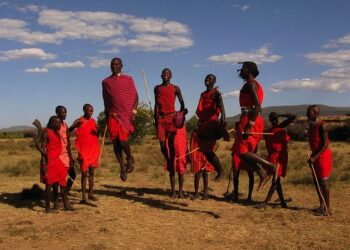Exploring Africa’s Rich Culture: Celebrating Diversity and Traditions
Africa is a continent of astonishing cultural wealth, a land where ancient traditions, vibrant art, and diverse languages intertwine to form one of the most captivating cultural mosaics on Earth. As we journey through its regions, we encounter a tapestry of music, dance, cuisine, rituals, and storytelling—each reflecting the heartbeat of its people and the history that shaped them.
A Continent of Diversity and Heritage
Africa is home to over 1.4 billion people and more than 3,000 distinct ethnic groups, each contributing to the continent’s immense cultural diversity. From the nomadic tribes of the Sahara to the coastal communities of the Indian Ocean, African culture thrives in its differences while remaining united by shared values of community, respect, and spirituality.
This cultural diversity is not merely a reflection of geography; it is a testament to centuries of adaptation, trade, migration, and resilience. Africa’s traditions are passed down through generations—woven into songs, ceremonies, attire, and folklore that keep ancestral memories alive.
Traditional African Values and Beliefs
At the heart of African culture lies a deep sense of communal identity. The African philosophy of Ubuntu, meaning “I am because we are,” embodies the belief that human existence gains meaning through relationships and mutual respect.
Traditional beliefs often center around spiritual harmony with nature, ancestral worship, and moral guidance through oral traditions. Across many societies, elders play a vital role as keepers of wisdom, guiding younger generations and maintaining social balance.
African spirituality, though diverse, shares common threads—recognition of a supreme creator, reverence for ancestors, and a connection between the physical and spiritual worlds. These beliefs continue to influence contemporary African societies, blending seamlessly with Christianity, Islam, and other modern faiths.
Languages: The Voices of a Continent
Africa’s linguistic landscape is unparalleled. With over 2,000 languages, it is the most linguistically diverse continent in the world. Major language families such as Niger-Congo, Afro-Asiatic, Nilo-Saharan, and Khoisan reveal deep historical connections across regions.
Languages such as Swahili, Yoruba, Zulu, Hausa, and Amharic serve as cultural bridges, linking communities through trade, diplomacy, and storytelling. Meanwhile, colonial languages like English, French, Portuguese, and Arabic coexist alongside indigenous tongues, shaping Africa’s multilingual identity.
In recent years, there has been a powerful movement to revive and preserve native languages, recognizing them as key to cultural heritage and identity. Schools, media, and digital platforms across Africa now embrace local languages to promote cultural pride and linguistic preservation.
The Art and Symbolism of African Expression
African art has long been revered for its spiritual depth and symbolic storytelling. From intricate masks and sculpturesto vibrant textiles and beadwork, every piece carries meaning—honoring ancestors, deities, or marking rites of passage.
Sculpture and Mask-Making
In West Africa, masks play a vital role in ceremonies and rituals. Crafted from wood, ivory, or bronze, they are believed to embody spiritual forces or ancestral spirits. The artistry of the Benin Bronzes or the Dogon wooden carvingsshowcases remarkable craftsmanship that continues to influence global art movements today.
Textiles and Fashion
Africa’s textile traditions are rich in symbolism and color. Kente cloth from Ghana, with its geometric patterns and vivid hues, tells stories of royalty, wisdom, and unity. In East Africa, the Kanga and Kikoy garments express identity through vibrant patterns and Swahili proverbs, while in North Africa, Berber weavings reflect ancient motifs of protection and fertility.
Modern African fashion blends traditional techniques with contemporary design, captivating global runways and redefining cultural expression through clothing.
African Music and Dance: The Rhythm of Life
Music in Africa is more than entertainment—it is a language of the soul, a form of communication deeply tied to spirituality, celebration, and community. Drums, flutes, string instruments, and vocals combine to create rhythmic complexity and emotional resonance.
Traditional Rhythms
In West Africa, the djembe drum speaks a universal language of rhythm, leading dancers in movements that tell stories of love, harvest, and victory. Across the continent, instruments like the mbira of Zimbabwe or the kora of Senegal enrich Africa’s musical heritage with melodic intricacy and spiritual meaning.
Modern African Sounds
Contemporary African music continues to influence global genres. Afrobeats, Amapiano, and Bongo Flava blend traditional rhythms with modern flair, gaining worldwide acclaim. Artists like Burna Boy, Angelique Kidjo, and Wizkidare ambassadors of Africa’s evolving sound, bridging cultural gaps while honoring their roots.
Dance, equally expressive, remains a vital part of community life—from the energetic Zulu dances of South Africa to the graceful Tigrigna movements of Ethiopia, each performance is a vibrant reflection of identity and joy.
Cuisine: A Taste of Tradition
African cuisine mirrors its cultural diversity—rich, flavorful, and steeped in tradition. Each region brings unique ingredients and cooking styles, reflecting local resources and historical influences.
West African Delights
West Africa is famous for hearty dishes like Jollof rice, Egusi soup, and suya—a spicy grilled meat delicacy. The use of spices, palm oil, and grains creates robust flavors that define the region’s culinary identity.
East African Flavors
In East Africa, dishes like ugali, injera, and nyama choma bring people together in communal feasts. The influence of Indian and Arab traders introduced spices, coconut milk, and flatbreads, enriching the coastal cuisine.
North and Southern African Specialties
In North Africa, the cuisine is a fusion of Mediterranean and Arab influences, with iconic dishes like couscous, tagine, and harira. Meanwhile, Southern Africa offers braai (barbecue) culture, biltong, and pap, reflecting both indigenous and colonial culinary traditions.
Across the continent, food is not just nourishment—it is a celebration of togetherness, a reflection of history, and a bridge connecting generations.
Festivals and Celebrations: Unity in Diversity
African festivals are colorful, joyous, and deeply symbolic, celebrating everything from harvests to ancestral spirits. They are occasions for dance, music, storytelling, and community bonding.
The Durbar Festival in Nigeria honors royalty with parades of horsemen and traditional regalia. In Ethiopia, the Timkat Festival celebrates Epiphany with spiritual processions and water blessings. Meanwhile, South Africa’s Cape Town Carnival merges ancient traditions with contemporary creativity, showcasing the continent’s artistic dynamism.
These festivals not only preserve cultural heritage but also attract global visitors eager to experience the authentic pulse of African life.
Preserving and Promoting African Culture in the Modern World
In the face of globalization, African nations are taking strides to protect and promote their cultural heritage. Museums, cultural centers, and digital archives are preserving oral histories and artifacts for future generations.
Across the diaspora, African culture continues to thrive—through art, fashion, film, and literature. Movements like Afrofuturism celebrate the fusion of African heritage with modern innovation, presenting a bold vision of Africa’s cultural renaissance.
Conclusion: Honoring Africa’s Enduring Spirit
Africa’s culture is not static; it is alive, evolving, and resilient. From ancient rituals to modern art, every expression tells a story of strength, creativity, and unity. As we explore its traditions and diversity, we gain a deeper appreciation of a continent whose cultural wealth continues to inspire the world.
To celebrate Africa is to celebrate human connection, timeless wisdom, and the beauty of diversity—a testament to the enduring spirit of a people whose heritage continues to shape our global story.














